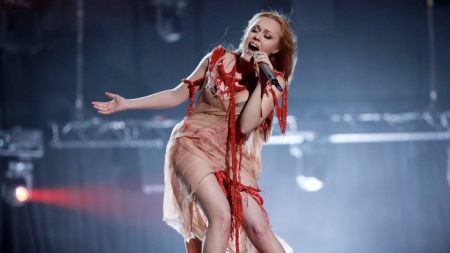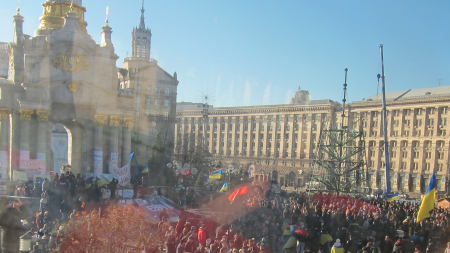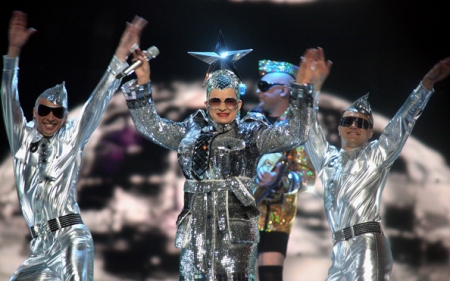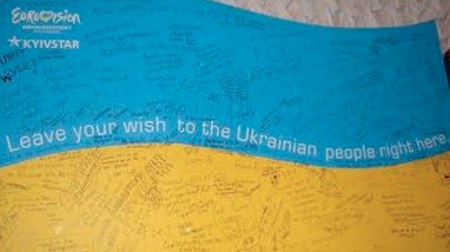As rehearsals for this year’s Eurovision Song Contest get under way, many people are looking at the activities between Russia and Ukraine and wondering what would happen on the Copenhagen stage. ESC Insight’s Dr Eurovision himself, Paul Jordan, takes a look at the situation through the filter of the Song Contest.
At the 2010 Eurovision Song Contest, Ukrainian singer Alyosha sang “Sweet people, what have we done?” Never before has a line been more applicable to the situation facing the same country today.
In November 2013 (during Ukraine’s hosting of the Junior Eurovision Song Contest), the then president of Ukraine, Viktor Yanukovych, abandoned an agreement which would have seen closer ties between Ukraine and the EU as well as the release of former Prime Minister Yulia Tymoshenko from prison. Small protests began and comparisons with the Orange Revolution of 2004 were made.

Alyosha on stage at ESC 2010 (picture: eurovision.tv)
Fast forward nearly 6 months and what started as a relatively contained protest against a political decision has nearly turned into full-scale war. I’ve worked extensively in Ukraine and was there in October last year where there was huge optimism for the future. The Ukraine I see on the news daily is barely recognisable.
Will The Real Ukraine Please Stand Up?
Ukraine is a complex and contradictory country. Succinctly capturing the essence of Ukrainian national identity is no easy task. Ukrainian nation and state building was slow and piecemeal in the immediate aftermath of the collapse of the Soviet Union. Ukrainian politicians took a middle of the road approach. Successive presidents Kravchuk and Kuchma remained on good terms with Moscow despite attempts to integrate with Europe.
In practice, both leaders did little to move Ukraine towards this goal. This has been labelled as “declarative Europeanisation” by political scientist Kataryna Wolczuk, in that only lip service was paid to the idea of Ukrainian integration into European structures such as the European Union with little else tangible forthcoming in reality. Presidents Kravchuk and Kuchma promoted a sense of nationhood which was not based on ethnic criteria and accepted the use of Russian in state business, despite the implementation of one official state language, Ukrainian. The lack of a uniform consensus on a constitution, which was finally ratified in June 1996, making Ukraine the last former Soviet republic to do so, exemplifies the protracted and complex nature of Ukrainian nation building.

Where It All Started in 2013 (picture: Ewan Spence)
Ukraine has been described as an “amalgam of regions” with different ethno-linguistic, economic, cultural and political profiles. Whilst the media depict the country as roughly split between a pro-Russian east and a Ukrainian, pro-nationalist west, the situation is more complicated than this.
Unlike in many former Soviet Republics, language is not necessarily the marker of identity in Ukraine. Those who speak Russian as a first language do not necessarily identify as Russian. Even Miss Ukraine in 2005 spoke Russian as a first language yet identified very much as Ukrainian. In the capital, Kyiv, people commute between languages. Alarmingly, reports emerged recently of people being attacked in the east for speaking Ukrainian rather than Russian and similar reports have emerged of the opposite in the west.
Unlike the Orange Revolution, which was largely peaceful, the current crisis has seen neighbours turn on each other, communities divided with an atmosphere of fear and mistrust spreading throughout the country. Hundreds have been killed and dozens more missing. The situation in Ukraine is serious and appears to be escalating. In Ukraine people have been in a state of limbo ever since independence; caught between Russia and the West and shackled by a series of corrupt governments and the future at present looks bleak.
Ukraine And The Eurovision Song Contest
One of the questions many people have asked me has been whether Ukraine will withdraw from the contest this year. I think this was always highly unlikely, and if anything, the current crisis makes Ukraine’s participation in Eurovision all the more important and all the more certain. Eurovision serves as an opportunity to unite Europe, and whilst Terry Wogan famously said that it just shows how far apart we all are, it really does capture the imagination of the continent and for one night of the year, we really do “share the moment” to quote NRK’s slogan from 2010. As we saw with the war in Bosnia in the 1990s, Eurovision is a chance to continue to be a part of the international community, for marginalised people, this is an opportunity not to be missed.
This isn’t the first time that Ukraine’s participation in Eurovision has become politicised though. In 2005 their entry ‘Razom nas bahato, nas ne podolaty‘ (Together we are many, we cannot be defeated) by Greenjolly, the unofficial anthem of the Orange Revolution, was controversially chosen to represent Ukraine at the Eurovision Song Contest. At the request of Deputy Prime Minister Mykola Tomenko, four wildcards were entered into the national selection programme. One of these wildcards was a pro-Yushchenko political anthem by the band Greenjolly. The group therefore bypassed the heats. The group’s entry went on to win the competition and were to represent Ukraine in the Kyiv final. Largely seen as a political coup, the actions were highly controversial with both public and competing artists alike:
It was a political decision. It was a really hard period in Ukraine because of the revolution. This team, they sang a song about the party, the President, it’s a little bit political even, the situation. It was so political and yet the contest should not be about politics (Ani Lorak, Interview, Belgrade, 16.05.2008).
Further controversy ensued when the EBU rejected the song as it contravened the ban on political references. The mention of Yushchenko as president in the chorus of the song was dropped and more generic phrases were introduced in English, the entry then was allowed to proceed to the Eurovision finals. The actual Eurovision performance of ‘Razom nas bahato, nas ne podolaty‘ included direct and explicit references to the Orange Revolution.

Is there a hidden message here?
At the start of the performance the two backing dancers wore handcuffs, symbolising the stifling of democracy which was such a driving force for protestors in Ukraine. As the performance culminated, the handcuffs were broken. Again, the latter can be seen as a metaphor for Ukraine. As a result of the protests described in the song; the country is now free. Perhaps unsurprisingly, the performance received the largest reaction in the hall on the night.
In 2007 controversy flared up once again when a well-known drag artist, Verka Serduchka was chosen to represent the country at the contest. This angered many people including politicians who feared that such a “vulgar and grotesque” act would be damaging to Ukraine’s international image. Ukrainian Member of Parliament Taras Chornovil called on Ukrainians to boycott the event stating that the selection of Serduchka would not be perceived by other European countries as “normal” and that it would bring shame upon the Ukrainian international image of the country.
I guess some of our esteemed experts saw those “hot Finnish guys” dressed as monsters but didn’t quite understand that there is subculture and there is pseudo culture. Those monsters are part of their subculture, which has the right to exist. But all these hermaphrodites have never been accepted anywhere. Therefore I think that this will be a serious embarrassment factor and the world will see us as complete idiots. (Taras Chornovil, Fraza, 13 March 2007)
The entry was called ‘Dancing Lasha Tumbai’ and was performed in English, German, Russian and Ukrainian. Further controversy erupted when the lyrical content of the song was analysed; ‘Dancing Lasha Tumbai‘ bore a phonetic resemblance to ‘Russia goodbye‘, a further ode to the Orange Revolution of 2004-2005. Furthermore the lyrics made reference to Maidan Square where the political demonstrations took place. Serduchka’s claim that ‘lasha tumbai‘ was Mongolian for ‘whipped cream‘ was dismissed by the Mongolian embassy in Moscow suggesting that the ambiguity had deliberate political connotations.
The View From Copenhagen
It’ll be interesting to watch both Russia and Ukraine in the contest this year. Whilst the contest is, according to the EBU “non-political”, there may well be political references made on stage or even during the voting itself.
Will be there a remark similar to Anke Engelke’s comment to Azerbaijan in 2012? Will the votes from Crimea be classed as Russian or Ukrainian? According to the EBU it depends on which mobile provider picks up the votes. Will there be an anti-Russian backlash as a result of the situation in Ukraine?
Certainly other former Soviet Republics are watching the situation with concern, since they too have sizeable Russian speaking populations that Moscow could claim to be protecting. I think there will almost certainly be a hostile reaction to the Russian entry from the audience, not because of Ukraine but because of the anti-gay laws introduced last year. As I discussed in a previous article, the situation facing LGBT people in Russia is alarming however, does that mean that grown adults at a concert should be booing teenagers representing their country? Or is this a justified expression of protest, a freedom of expression that so many countries in Eurovision deny to their citizens?
It’s ironic that Ukraine’s entry is called ‘Tick Tock‘ when the country is essentially a ticking time bomb, whilst the Russian twins, the Tolmachevy Sisters tell the world to show some love in their song ‘Shine‘. There is an argument that politics and entertainment should not be mixed. However the two are not mutually exclusive and politics comes into Eurovision whether the organisers of the contest like that or not. Eurovision has the capacity to illuminate wider debates and shine a spotlight on participating countries as well as the hosts.
After Ukraine’s hosting, the Eurovision Song Contest actually led to real change since visa regulations for EU citizens were lifted specifically for Eurovision in 2005 and at the time of writing, these visa regulations are still in place today; a lasting legacy of the Eurovision Song Contest.

Messages of hope for Ukraine
At Eurovision 2005 delegates were asked to leave their good wishes for the Ukrainian people on a special billboard. Sadly, I don’t think those good wishes for the Ukrainian people came true, do you?









Mariya is great candidate for Ukraine. I dont know young ukrainian singers who is better than she. and her song is perfect for Eurovision
Why would people ask “Are Ukraine going to withdraw” and not “Why haven’t Russia been kicked out yet”?
The fact that Russia sent teenagers is irrelevant. The Tolmachevy Sisters are going to be on stage representing a country that believes human rights violations and illegally invading their neighbours are acceptable, so they have to be prepared for people protesting those actions. And if the Russian delegation deliberately sent two young girls as some cynical way of trying to deflect from those protests, then they need to be publicly criticised as well.
every year Ukraine have great candidates. And 2014 is not an exception. Mariya is young, but very talented and powerful singer. She will be on top
I think Mariya is the best participant from Eastern Europe this year and will get very high place on contest
Mariya is really brave. Not many singers ready for this hard work – to be the face and voice of a country in this hard times for Ukraine
Whether Russia illegally invaded Ukraine is debatable and is being debated. Prominent western experts and politicians, amongst those none less than former german prime ministers, strongly feel that Russia isn’t breaking any international law. If people of that prestige don’t even agree that unlawful behaviour has occurred, surely mere fans should refrain from expressing opinions like Peter above.